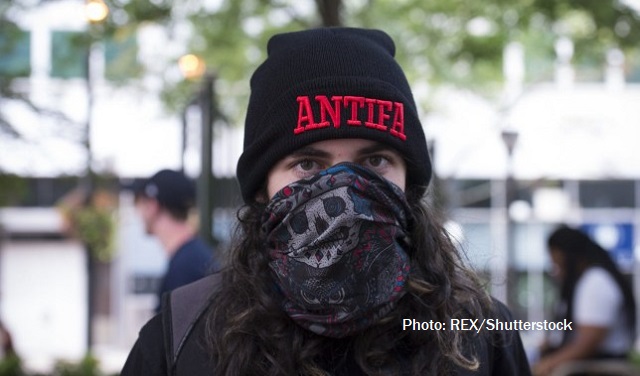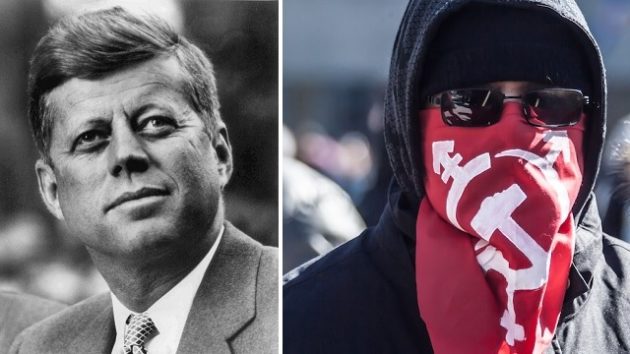From JFK to the Resistance: What has happened to the Democratic Party?

The July/August 2017 issue of The Atlantic had an article titled “What’s Wrong With the Democrats?” by Franklin Foer. Foer wrote:
Leaderless and loud, the Resistance has become the motive power of the Democratic Party. Presidential hopefuls already strive to anticipate its wishes. Elected officials have restructured their political calculus to avoid getting on its wrong side. The feistiness and agitation of the moment are propelling the party to a new place.
But where? The question unnerves Democrats, because the party has no scaffolding. All the dominant leaders of the last two generations—the Clintons, Barack Obama—have receded. Defeat discredited the party’s foundational strategy—or, at the very least, exposed it as a wishful description of a more distant future, rather than a clear plan for victory in the present. Resistance has given the Democrats the illusion of unity, but the reality is deeply conflicted. Two of the party’s largest concerns—race and class—reside in an increasing state of tension, a tension that will grow as the party turns toward the next presidential election.
To produce a governing majority, the party will need to survive an unsettling reckoning with itself. Donald Trump didn’t just prevail over the Democrats; he called into doubt their old truths. [Emphasis added]
The Democratic Party is eating its own. Watch this video about how a Hispanic socialist candidate won the Democrat primary in New York because she targeted her Democratic opponent was white.
As a young man I was a JFK Democrat. He was my American idol. It was the time of Camelot and at the peak of American economic, political and military power. JFK embodied a vision of the future that Americans embraced.
Allow me to point out a few examples of what JFK brought to the Democratic Party:
- JFK was a Catholic. He held those beliefs and spoke about his beliefs. JFK stated, “For while this year it may be a Catholic against whom the finger of suspicion is pointed, in other years it has been, and may someday be again, a Jew— or a Quaker or a Unitarian or a Baptist. It was Virginia’s harassment of Baptist preachers, for example, that helped lead to Jefferson’s statute of religious freedom. Today I may be the victim, but tomorrow it may be you — until the whole fabric of our harmonious society is ripped at a time of great national peril.”
- JFK was a decorated Navy Combat Veteran. JFK Commanded PT109. He served proudly and loved the military. He created the U.S. Army Special Forces, which led to the creation of special operations forces such as the Navy SEAL program. JFK said, “Let every nation know, whether it wishes us well or ill, that we shall pay any price, bear any burden, meet any hardship, support any friend, oppose any foe to assure the survival and the success of liberty.” JFK supported compulsary military service and noted, “A young man who does not have what it takes to perform military service is not likely to have what it takes to make a living. Today’s military rejects include tomorrow’s hard-core unemployed.”
- NASA and reaching for the stars. It was JFK who believed in American ingenuity and wanted to put a man on the moon. He and his policies did just that.
- The National Rifle Association. JFK was a life member of the NRA. On March 20, 1961 JFK became a life member and in a letter to the NRA President Franklin L. Orth stated, “Through competitive matches and sports in coordination with the National Board for Promotion of Rifle Practice, the Association fills an important role in our national defense effort, and fosters in an active and meaningful fashion the spirit of the Minutemen.” BHO hates the NRA and all it stands for. BHO, his administration and Democrats have taken an adversarial position on the Second Amendment and the right to bear arms. JFK supported Second Amendment rights for Americans, saying in an April 1960 statement, “By calling attention to a well-regulated militia, the security of the nation and the right of each citizen to keep and bear arms, our founding forefathers recognized the essentially civilian nature of our economy. Although it is extremely unlikely that the fears of government tyranny, which gave rise to the Second Amendment, will ever be a major danger to our nation, the Amendment still remains a major declaration of our basic civilian-military relationships, in which every citizen must be ready to participate in the defense of his country. For that reason, I believe the Second Amendment will always be important.”
- JFK added the M16 (AR15) rifle into the U.S. military inventory. It was JFK who introduced the Armalite M16 (AR-15) rifle into the inventory of the U.S. Military. Under JFK, Secretary of Defense Robert McNamara ordered Secretary of the Army Cyrus Vance to test the M14 , the AR-15 and the AK-47 . The Army’s test report stated only the M14 was suitable for Army use, but Vance wondered about the impartiality of those conducting the tests. He ordered the Army Inspector General to investigate the testing methods used, who reported that the testers showed undue favor to the M14. McNamara ordered a halt to M14 production in January 1964. In November, the Army ordered 85,000 XM16E1s for experimental use, and the Air Force ordered another 19,000. Meanwhile the Army carried out another project, the Small Arms Weapons Systems (SAWS) , on general infantry firearm needs in the immediate future. They highly recommended the immediate adoption of the weapon, so much so that they started referring to it as the M16.
- Immigration policy was much different under JFK. JFK in his book “A Nation of Immigrants” wrote, “The interaction of disparate cultures, the vehemence of the ideals that led the immigrants here, the opportunity offered by a new life, all gave America a flavor and a character that make it as unmistakable and as remarkable to people today as it was to Alexis de Tocqueville in the early part of the nineteenth century.” In his book JFK Kennedy outlines three main reasons why immigration to the U.S. took place: freedom from religious persecution, political oppression and economic hardship. While JFK believed in a generous, fair and flexible immigration policy he did not believe in open borders and no immigration policy.
- On Federal taxation and balancing the budget. As JFK wrote on September 18, 1963, “A tax cut means higher family income and higher business profits and a balanced federal budget….As the national income grows, the federal government will ultimately end up with more revenues. Prosperity is the real way to balance our budget. By lowering tax rates, by increasing jobs and income, we can expand tax revenues and finally bring our budget into balance.” BHO has raised taxes, spent like no other president and increased the federal deficit to historic levels.
- Communism and the Free World. As JFK stated in his 1961 inaugural address, “Let every nation know, whether it wishes us well or ill, that we shall pay any price, bear any burden, meet any hardship, support any friend, oppose any foe, in order to assure the survival and the success of liberty. This much we pledge —- and more. To those old allies whose cultural and spiritual origins we share, we pledge the loyalty of faithful friends. United, there is little we cannot do in a host of cooperative ventures. Divided, there is little we can do—for we dare not meet a powerful challenge at odds and split asunder….We dare not tempt them with weakness. For only when our arms are sufficient beyond doubt can we be certain beyond doubt that they will never be employed.”
- JFK and McCarthyism. Joseph Kennedy had befriended McCarthy because he found him to be a likable fellow Irish-Catholic who had all the right ideas on the domestic communist menace. These warm feelings were quickly transferred to the entire Kennedy family. JFK liked the fact that McCarthy went after the “elites” in the State Department whom JFK regarded with contempt. Even before McCarthy made accusations against the State Department of subversion, JFK had already aligned himself with the militant anti-communists who blamed the Truman State Department for the “loss” of China. So JFK declared on the House floor in January 1949, “The responsibility for the failure of our foreign policy in the Far East rests squarely with the White House and the Department of State.”
I could go on and discuss how JFK worked with Congress. How JFK embraced the Constitution. At his 1962 State of Union, JFK stated, “The Constitution makes us not rivals for power but partners for progress.”
Just like Foer, I ask, “What has happened to the Democratic Party?”
RELATED ARTICLE: SALON: Let’s abandon the Democrats: Stop blaming Fox News and stop hoping Elizabeth Warren will save us



Excellent piece. In addition to these attributes, it might be noted that JFK’s fiscal policies led to the last complete decade in American history in which the U.S. ended up with a true budget surplus, the 1960’s. Contrast that with Kennedy’s successor, Johnson, who began the deficit spending curse with his ‘Great Society’ programs. Dems have been in love with national debt growth since then.
D.T.
Thanks for reading and commenting. You are correct. Things went downhill once Johnson was sworn in.